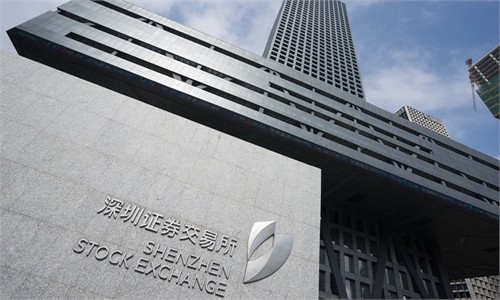State fund’s return bolsters market confidence, attracting optimistic funds from China and abroad

Photo: VCG
Led by financial and new-energy-related stocks, the Chinese A-share market rose across the board on Thursday. The gains came after state-owned Central Huijin Investment, following an 8-year hiatus, increased its holdings by more than 100 million shares of the four major Chinese banks on Wednesday.
Experts said that this move sent a strong signal to stabilize the market. At a crucial point when the economy is showing signs of stabilization and improvement, the investment contributed to promoting the real economy's growth, which will aid in achieving the annual economic goals.
After a strong opening on Thursday, the three major Chinese stock indices continued to gain ground, with the Shanghai Composite Index up 0.94 percent at the close, the Shenzhen Component Index rising by 0.83 percent, and the ChiNext Index climbing by 0.76 percent.
Banking-related stocks rose on the bourses of both the Chinese mainland and the Hong Kong Special Administrative Region.
Net inflows into the A-share market through north-bound link-ups between the mainland and Hong Kong bourses stood at 6.6 billion yuan ($906 million), ending a four-day streak of net outflows.
Before the strong performance on Thursday, New York-listed Chinese stocks made rosy gains immediately after the news broke on Wednesday evening. The NASDAQ Golden Dragon China Index increased 0.39 percent to 6,775.91, and the FTSE China A50 added 0.85 percent to 12,391.30.
According to statements released by the four Chinese banks, Central Huijin Investment on Wednesday added holdings of about 477 million yuan worth of stocks in Bank of China, Agricultural Bank of China, China Construction Bank and Industrial and Commercial Bank of China. It plans to continue buying in the next six months.
"The recent market performance has been relatively weak, so Huijin's timely entry has the potential to provide a substantial boost to market confidence, revitalizing the capital markets and driving incremental capital," Yang Delong, chief economist at Shenzhen-based First Seafront Fund Management Co, told the Global Times on Thursday.
After a period of correction, the banking sector's investment value has gradually emerged, making it a good deal to increase stakes in the banks, Yang said.
Central Huijin, established in 2003, is a wholly state-owned company with robust capital resources. It holds controlling or significant stakes in nearly 20 leading enterprises, spanning four major categories - banks, insurance, securities and diversified institutions.
Huijin's increased holdings are considered a vital indicator of market stability. During the challenging market conditions of 2008 and 2013, Huijin stepped in multiple times, aiding the market in rebounding from its downturns, economists said.
The move signified a clear stance that China's state-owned banks are reasonably valued and present an attractive investment proposition, Dong Shaopeng, a senior research fellow at the Chongyang Institute for Financial Studies at the Renmin University of China, told the Global Times on Thursday.
Amid the hype about China's economic collapse in recent months, many foreign media outlets have also turned their focus toward the Chinese stock market, asserting that foreign capital has abandoned A-shares or other yuan-denominated assets.
Right now, this unsubstantiated speculation has gradually died down, and more institutional investors are reaffirming their confidence in the Chinese economy and stock market.
In its latest China equity strategy report for the fourth quarter, Goldman Sachs recommended an overweight position in Chinese stocks in the Asia-Pacific region, betting on a potential rebound by the end of this year, according to media reports.
"Huijin's move came at a great time as the economic data have exceeded expectations since August, indicating a strengthening momentum in the economic recovery, and marked improvements in both consumer and business confidence," Zhou Maohua, an economist at China Everbright Bank, told the Global Times on Thursday.
Stabilizing the stock market can help create a stable financing environment, which will draw capital into the real economy. Moreover, reasonable valuations of listed companies can encourage the influx of new entrepreneurial capital into industrial investments, Dong said.
In addition to stabilizing the stock market, the effects of China's economic stimulus policies are gradually becoming evident. There will be more economy-boosting measures in the fourth quarter, as part of a series of initiatives aimed at achieving the annual economic growth target of around 5 percent, Yang said.


